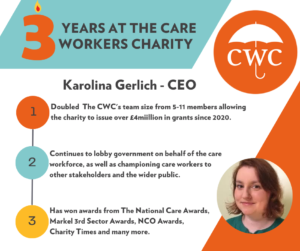 Marking her third anniversary as chief executive of The Care Worker’s Charity, Karolina Gerlich says it’s time to provide the care workforce with the reform, wages, career opportunities and recognition it deserves.
Marking her third anniversary as chief executive of The Care Worker’s Charity, Karolina Gerlich says it’s time to provide the care workforce with the reform, wages, career opportunities and recognition it deserves.
Having spent more than 10 years as a care worker, as well as being a voluntary chief executive for a leading campaigning organisation, Gerlich took the helm at The Care Workers’ Charity (CWC) in March 2020. The chair of the charity at the time was Ben Allen and since November last year Martin Jones, chief executive of Home Instead, has been in that role.
Gerlich immediately faced a baptism of fire with huge numbers of care workers desperately needing emergency support as they were forced to isolate during the first wave of the pandemic. The Covid-19 emergency fund was immediately set up and in the first week raised £100,000 and in the next two months the first £1 million that the charity had raised in one year.
The charity raised an unprecedented £3.2 million for care workers during the height of the pandemic in 2020 which meant a huge number of grants were paid to care workers. They were in desperate need of funding as they were losing income being unable to work with no Covid tests available at the time, very little PPE, working at the front line and making huge personal sacrifices, including staying away from their families to protect the people they supported with many workers losing their lives.
“The most important thing to us was to support as many care workers as quickly as possible,” Gerlich said. “They were on the front line. The government was not recognising that. We were applying for any funding we could find to every trust and foundation that would listen to secure money to cover sick pay and shielding costs to care workers.”
In 2020, Gerlich focused on diversifying the charity’s income streams and growth. The level of support care workers needed confirmed that the CWC was necessary and that it needed to grow. The team and trustees worked on the new strategy and continued to develop the support the charity offered, adding mental health support as care workers were bereaved, overstressed, working extra hours and suffering burnout.
Buoyed by its fundraising success, the charity’s workforce has doubled in size under Gerlich’s leadership from five in 2020 to 11 currently.
“I am incredibly lucky to have an amazing team of passionate, dedicated, hard working individuals that strive to do right by care workers and do their best within constraints of such a small team,” Gerlich says. “We are also lucky to have trustees that understand the sector and who have been a great support over the last three years.”
The charity’s growth was marred by the sad death of operations manager Sara Berio in August 2021, however. “That hit us hard as a team and brought us closer together,” Gerlich reflects. “Losing Sarah so suddenly made me realise you have to cherish people while they are around.”
While ensuring that fundraising by the CWC continues to go from strength to strength, Gerlich is also a leading champion of the professionalisation of the social care workforce.
“Buoyed by its fundraising success, the charity’s workforce has doubled in size under Gerlich’s leadership from five in 2020 to 11 currently.”
“Having been a care worker myself for many years I have always felt very passionately that care workers have been vastly underpaid and under recognised for the work they do and that needs to change, not just for the benefit of care workers but for the benefit of those who draw on social care and wider society,” Gerlich explains.
Led by Gerlich, the CWC lobbies government on behalf of the care workforce, as well as championing care workers to other stakeholders and the wider public.
“As people, care workers make a huge contribution to the wider society,” Gerlich notes. “They deserve to be paid fairly for the important work they do. Care work is difficult. Not just anybody can do it. Not just anybody should do it and people need to realise the most important thing is that the national government realises this.”
While recognition of the care workforce improved thanks to their amazing work during Covid, Gerlich says this has not been followed by national investment.
“I think we are still in a desperate need for national government to be very bold and brave in reform and investment and to recognise social care as a service in its own right and not a prop up Cinderella service to the NHS,” the chief executive continues.
“Care workers should have robust career progression opportunities and be paid a decent wage and not just at the National Minimum Wage level.”
Gerlich says care workers’ wages should be at a rate that is competitive with both the NHS and supermarkets to halt the ongoing loss of workers to healthcare and retail.
“Every care worker who works full- time should be able to pay their bills, buy the food they want, clothe their children and afford childcare and go out for a nice meal and have holidays,” Gerlich says.
“I don’t believe that if you work full- time you should just be able to make ends meets. Remuneration needs to be fair and respectful and in recognition of the complexity and importance of the role.”
While almost a quarter of the social care workforce are on zero-hour contracts, Gerlich says she is not in favour of their abolition, however, as long as there is flexibility on both sides.
“You should be offered the options of a minimum-hours or a zero-hours contract,” the chief executive argues. “However, zero-hours contracts especially in home care are often the only option because of how social care is funded because providers are often not given enough funding to give the extra hours or to give people minimum hours. Abolition of zero-hours contracts is no silver bullet for solving the social care crisis. As with many things it comes down to nothing but the funding and settlement for social care rather than individual level offers being made.”
Gerlich is also a passionate champion for the full registration of care workers in order to provide greater recognition and a sense of identity for the workforce.
“A professional body for care workers that is nationally recognised and holds qualifications and accountability and a place to come for help for support would be hugely beneficial for care workers and the people they support,” Gerlich says. “That is something we have supported for a long time.”
Looking ahead, the charity head says she will continue to champion the professionalisation of the care workforce as well as working tirelessly to raise funds for those in need.
“We would love to be able to influence national policy enough to change the status quo for care workers and will keep on campaigning,” Gerlich says.
“We invite any provider, local authority, supplier or care organisation to partner with us, join in on events with us and donate, or to help us raise more funds to support care workers as much as we can.”
With Gerlich’s campaigning passion undimmed after three highly successful years, the charity remains in the best possible hands as it offers
Date Published: April 6, 2023 – https://caring-times.co.uk/feature/anniversary-championing-care-workers/
